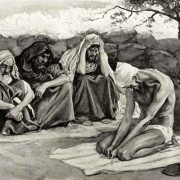No More Bildad, Zophar or Eliphaz for Me
After much reflection, I’ve made an important determination about the way I want to live my life and conduct myself in ministry.
I no longer want to be a Bildad, Zophar, or Eliphaz.
For those of you who remember the story of Job, these were the names of Job’s three friends. When they heard the tragic news that Job had lost his children, his property, and then finally his own health, they came together from their respective lands to mourn with Job, and to comfort him.
So far so good.
For seven days and seven nights they sat down with Job in mourning. Each of them had torn their robes (an oriental expression of great grief), lifted their voices and wept, and sprinkled dust on their heads (another sign of mourning and grief)—and then they sat silently with their friend, empathizing with him, grieving with and for him.
Again, so far so good.
The Job spoke. Job spoke out of his own personal confusion and pain. He spoke—not really knowing why these things had happened to him. He spoke without knowing that in fact, his life had become a testing ground for a spiritual battle between the devil and Almighty God. Job, whom God was proud of, experienced everything being taken from him except his own life. In the process, it would be determined whether or not a man (Job) could truly worship and honor God even though God allowed that man (Job) to go through unspeakable suffering.
It should be said at this point that Job passed the test. At the end of the story, God confirmed that all throughout his trials, Job had spoken that which was right concerning Him.
Well … after his friends empathized with him for seven days, Job finally spoke up. When Job spoke, he cursed the day of his birth and wondered out loud why he was allowed to even exist, since he was in this state of misery. In stating these things, Job didn’t at all conclude that he was suffering due to anything that he had done wrong. Without saying it, he was defending his own integrity.
This was too much for Job’s three friends to handle. Each of them had a clear “theology” of suffering that concluded that evil, sinful people suffer and righteous people do not suffer. We get what’s coming to us in this life, or so they said.
As the dialog wears on throughout the book, these three men keep beating the same drum, and Job continues to insist that he is innocent of any wrongdoing that caused his current pain. His friends feel very confident that they know exactly why Job is suffering, and exactly what God is doing in Job’s life.
They were wrong. Exactly wrong, in fact. At the end of the story, they were sharply rebuked by the Lord Himself! They had not spoken of God that which was right. They were wrong about God! Job, on the other hand, was vindicated. He was right about God, according to the Lord Himself.
So what’s the lesson here for me? For you?
Speaking personally, I can tell you that many times as I’ve encountered sufferers, I have automatically gone the path of trying to analyze and summarize what went wrong and why it had happened. I would come to quick conclusions, and then base my input to them on those conclusions. I’m sure there were times I was correct, but I also know there were times when my input wasn’t what was needed. I so easily develop opinions about people, and about their situations. Too often, I’ve been a Bildad, Zophar, or Eliphaz in someone’s life.
Nowadays, I aspire to be bearer of grace and a breath of healing in other’s lives. That does not mean I won’t speak the truth in love as the situation calls for it … but it does mean that I’m going to try not to jump to conclusions and judge a matter prematurely. I also have no need to figure out God’s ways in a person’s life. He is doing things I have no knowledge of, and is working in ways that I could not even imagine.
I want to fulfill these two passages:
1 Corinthians 13:7 [Love] bears all things, believes all things, hopes all things, endures all things.
Ephesians 4:29 Let no corrupt word proceed out of your mouth, but what is good for necessary edification, that it may impart grace to the hearers.
During my own trials of the last couple of years, almost 100% of the people with whom I spoke were understanding and empathetic, prayerful, non-judgmental, and encouraging to me. Only a few [that came to me] thought they knew what was happening in my life, and thought they knew what God was doing in me. Some even thought that God was doing these things to me. One woman asked (right in the middle of my worst pain), “So are you broken yet?”
People that could believe the best about me and could trust God for my life—I considered them “safe.” The few that could not do that, they were unsafe.
One of the keys to my personal recovery has been to keep safe people in my life. They are the ones who have trusted the Lord with me. They have prayed and been with me in my journey—as I’ve sought to grow, to hear from the Lord, and to move on toward the future the Lord has for me. When I’ve needed truth, it’s been the safe people who were best suited to deliver it.
Their example to me has taught me a lot about grace, and has caused me to ask myself the questions, “have I been a safe person for others?” I assume that at times, I have not been. But I want to be that now. No more Bildad, Zophar, or Eliphaz for me. At least that’s my heart.
How do I think about others when I’m away from them?
What do I say about others when I speak of them?
What do I believe about others as I relate to them?
Do I trust God to be the One who works in their life? Is He the sovereign Lord to them? Or do I think that I understand all?
When/if Jesus says to me, “Well done, you good and faithful servant,” I have a strong suspicion that His words will be rewards for grace that I’ve extended to others. It’s His grace, flowing through my life.
That’s the way we’re supposed to live. We’re free to do so. Grace allows us.
Blessed are the merciful, for they shall obtain mercy.
Thanks for reading.









